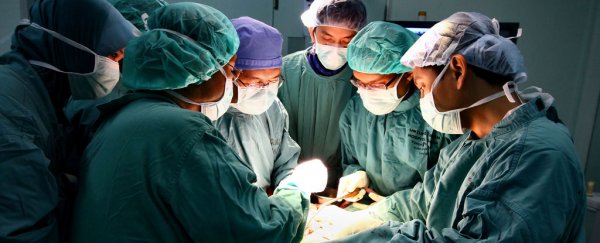Scientists have halved the amount of time it takes to perform genome sequence diagnoses in cases involving critically ill newborns. A new study published this week shows how physicians can diagnose genetic illnesses affecting babies in just 26 hours in emergency situations.
The findings, published in Genome Medicine, could mean the difference between life and death in neonatal intensive care units, where doctors have no time to lose in potentially life-threatening medical scenarios involving newborns.
According to the researchers from Children's Mercy Hospital Kansas City in the US and genetics tech company Edico Genome, genetic illnesses are behind a third of baby admissions to intensive care in the US and account for 20 percent of infant deaths. While genome sequencing in clinical emergencies was previously available in a limited capacity, it's expensive and takes at least 50 hours to complete – time that some young patients don't have.
"Diagnosing acutely ill babies is a race against the clock, as even one day of waiting can be a matter of life or death," said Stephen Kingsmore, the study's senior author, in a press release. "Obtaining a genetic diagnosis in only 26 hours means the right treatment can begin much sooner, eliminating extra anxiety for families and avoiding extra healthcare expenses."
The new system is possible due to new genomic data analysis technology manufactured by Edico Genome. Called Dragen, the system uses a specialised computer processor - the world's first such CPU designed specifically to analyse genetic data, which drastically reduced the amount of time it takes to sequence an individual's genome.
In their paper, the researchers describe how genetic data analysis that used to take over 22 hours can now be performed in just 41 minutes, theoretically enabling one Dragen unit to process some 350 complete genome sequences in a year.
The study, which retrospectively tested 35 infants who had already received treatment for their illnesses, diagnosed the babies' conditions in record time – albeit with a 57 percent success rate, indicating significant room for refinement as the technology matures.
"Clearly, while the application of [the system] appears tremendously promising, translating diagnoses into effective precision medicine is in its infancy," write the researchers.
Edico Genome believes the hardware will find a gap in a health care system that doesn't have the time, money or staff to handle genetic analyses via conventional methods. "Genomics is rapidly becoming a critical component for medical care, yet most hospitals don't have supercomputers or the personnel to manage the large servers required for subsequent data analysis," said Pieter van Rooyen, the company's CEO.
For the doctors at the frontline, they'll take any help they can get. "In some babies, we have minutes or hours. If a baby's blood sugar is low, basically you are counting the number of minutes without sugar," Kingsmore told Claire Maldarelli at Popular Science. "In those cases, any delays can result in disease complications."
